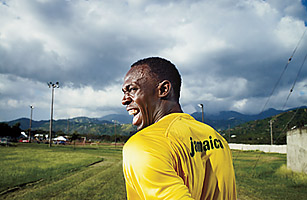
(4 of 4)
The Weight of a Nation
If you ever want to see Bolt slow down, check him out this early Sunday afternoon. He's visiting his alma mater, William Knibb High School, a place where graffiti covers the classroom walls and the weight room consists of a few pieces of equipment tucked into the corner of a teacher's office. He was at a party the previous night and didn't get any sleep. So after he emerges from a catnap, the world's fastest man drags his ass through the courtyard, where another segment of his commercial will be filmed. Though Bolt insists he has toned down his revelry, he's still a bit of a party animal. Beverage of choice: Guinness. Bolt admits he has tried marijuana, which in Jamaica is all too common. "Everybody smokes at least paper when they're young," Bolt says. "But smoking wasn't for me, because no one in my family really smoked." He insists pot isn't part of his repertoire.
Bolt makes no apologies for loving the nightlife. "I explain to people that I'm still young," he says. "I'm going to go out and enjoy myself. If that's going to be a problem, that's their problem. I've watched and seen a lot of superstars, especially in the States. Because they have to live by a certain standard, they take drugs, they do all kinds of stuff, just to not be stressed. I'm not going to let people drive me to be that crazy person."
Though Bolt is keen on enjoying his fame, he still has obligations. "Usain has given Jamaica a brand you can never pay for," says Edmund Bartlett, the Tourism Minister. The country has already bestowed the equivalent of knighthood, the Order of Jamaica, on Bolt. He is helping the tourist agency, and bureaucrats dragged him out on a recent Friday night to an event promoting Jamaica's trade interests. "He has a responsibility," says Nelson, head of the Institute of Caribbean Studies. "I hope he matures emotionally, spiritually, intellectually in a way that he can be a real teacher."
The global recession has hit Jamaica hard. Demand for the country's most valuable natural resource, a red-dirt ore called bauxite — the source for the base of aluminum — has slowed. For the first nine months of this year, the mining sector was down 48%. Remittances from the Jamaican diaspora in the U.S., Canada and Britain slipped 15% in that period. When you drive out of the Kingston airport toward the center of the city, a Bolt billboard greets you with welcome to jamaica. A few seconds later, you pass nothing but heartbreaking poverty. "We've got big problems on our hands," says Dennis Morrison, a Jamaican economist. "Big, big problems."
Bolt feels the weight of expectations. "I think I'm doing enough by putting Jamaica out there," he says. "I put myself first. I told myself I'd never let the country put me under pressure. I understand that, yeah, the country wants me to do well. But I also want to do well for myself. And at the end of the day, if anything happened to me, it's going to affect me and not my country." The constant calls for Bolt's help concern his confidants. "A lot of people want him to do this foundation, start this, start that," says Kim Bernard, a marketing executive and Bolt buddy. "People have to take it easy with him."
Ya, mon. On an early-December Saturday night on Jamaica's tranquil north coast, everyone is at ease. Thousands have journeyed to the "9.58 Super Party," which Bolt is hosting on a former sugar plantation where slaves once labored. The money raised by the event — tickets are selling for $25 to $80 — will help refurbish a health clinic in Bolt's home village. Stars like American rapper Ludacris have flown in. A showman, Bolt is onstage playing DJ, dancing as if he's broken another world record. The night has turned into a national celebration. "This shows that Bolt's respected," says Jacques Smith, a member of Bolt's Kingston-based track club. "If you're not respected in Jamaica, no one's going to come to your s___. Hear me?"
It's been a rough 2009, in Jamaica and the rest of the world. But thinking about Bolt's spine-tingling sprints in Berlin and watching him onstage, delivering pure elation to his country, offers at least a speck of comfort. "Breaking barriers is my thing," Bolt says. "I've been doing it since I was young, just setting the standards for a lot of people. I'll keep trying to break barriers and make the world happy." So it's not all bad. Because in 2010 and beyond, we'll all get to witness Usain Bolt dance.